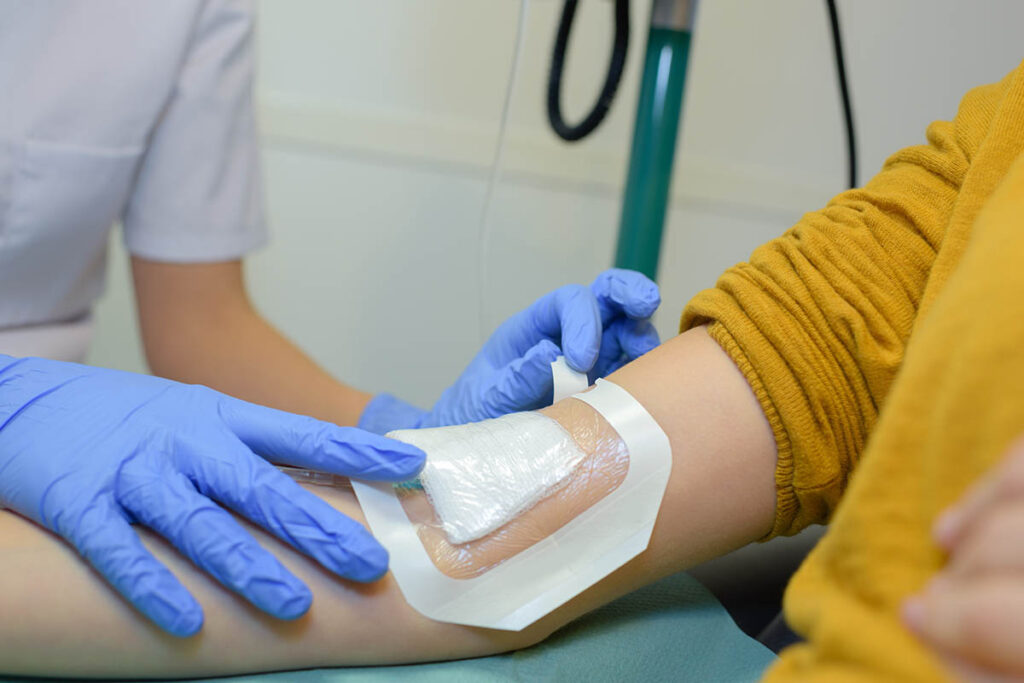People who inject heroin may develop abscesses, a type of skin and soft tissue infection. A heroin abscess may happen the first time a person uses the drug or to people who have used heroin for many years. Research has found that up to one-third of people who inject drugs currently have or recently had a skin abscess or infection. Heroin is the most frequently injected drug, and because of this, people who inject heroin could have a significant risk of developing an abscess. Without heroin addiction treatment, severe medical complications from heroin abscesses can occur, including amputations, sepsis, and death.
Heroin addiction treatment can have a key role in reducing the risk of abscesses and other infections caused by heroin use. A comprehensive drug rehab program could also help a person find sobriety and improve physical and mental health. To learn more, please reach out to Vertava Health today at 844.470.0410.
What Is a Heroin Abscess?
A heroin abscess is an infection of the skin and soft tissue. It causes pus to collect in or under the skin. When the infection is in a person’s skin, it’s called a cutaneous abscess. An infection that exists below the surface of the skin is a subcutaneous abscess.
An abscess can take two forms:
- Exploding abscess: The infection breaks through the skin and is visible on the skin’s outer surface.
- Impounding abscess: The pus forms beneath the skin. The infection spreads underneath the skin and does not break the skin’s surface.
Abscesses most commonly occur where the heroin is injected. However, they may develop anywhere. For instance, abscesses on the arms and legs are common, as these are frequent injection sites for the drug.
While some abscesses develop almost immediately, they typically take two to five days to develop.
Heroin Abscess Signs And Symptoms
Knowing the signs and symptoms of a heroin abscess could help a person or their loved one receive prompt medical care.
When a person has an abscess, they may have chills, fever, or swollen lymph nodes. The site of the abscess may be:
- Painful
- Red
- Shiny
- Swollen
- Tender
- Warm
An abscess may have a foul smell. It may also ooze pus when pressure is applied to the infected site or when the wound is bumped. Pus is a thick, cloudy liquid that may be greenish, yellowish-white, or yellowish-brown in color.
Risk Factors for Heroin Abscesses
Unsanitary injection practices, such as using dirty, old, used, or shared needles, can increase the risk of bacteria passing into a person’s body. In turn, people who engage in these practices may have a higher likelihood of getting an abscess.
Risk factors for heroin injection abscesses include:
- Unclean or dirty heroin needles can carry higher numbers of bacteria that cause abscesses. Failing to clean or sanitize a heroin syringe may also result in more bacteria being present.
- Using spit or saliva to clean a needle does not sanitize it. Doing so could expose a person to oral bacteria that cause abscesses as well.
- Sharing a heroin needle or syringe could transmit bacteria from one person to the next.
- Using a heroin needle over and over can cause it to become dull. A dull needle can create more damage at the injection site. This could make the skin and soft tissues more prone to infection.
Heroin Abscess Treatment
While some skin and soft tissue infections may heal on their own, an untreated abscess could lead to serious health problems. Treating an abscess at home could result in inadequate care and complications. Because of this, professional medical heroin treatment may be advised.
A doctor may perform an incision and drain the pus from the abscess in certain cases. Analgesia or hospital treatment may be necessary for certain infections. Antibiotics may also be necessary to treat the infection.
Further medical treatment may be necessary if an abscess has caused any other complications or medical conditions. Some, like septic shock or endocarditis, could require intensive treatment and a hospital stay.
Becoming sober can help a person avoid future abscesses and other dangers of heroin use.
Seek Treatment at Vertava Health Today
While the best drug rehab programs for heroin addiction help a person’s body heal, people with serious heroin-related medical problems may need specialized medical care or hospital-based services prior to rehab.
Once a person is stabilized, they can move to detox and rehab. Heroin can cause severe physical dependence, and because of this, a medical detox program for heroin is often recommended. A medically supervised detox program offers 24-hour oversight while a person’s body begins to flush the drug from its system. Medications, such as Suboxone, are commonly used to reduce withdrawal symptoms and cravings.
When a person has successfully detoxed, they can transition to rehab. An inpatient drug rehab program for heroin provides the highest level of care. Residential addiction treatment offers a sober community where a person can heal body, mind, and spirit from addiction. Contact Vertava Health today at 844.470.0410 for more resources on the dangers of heroin use and ways to get treatment.


